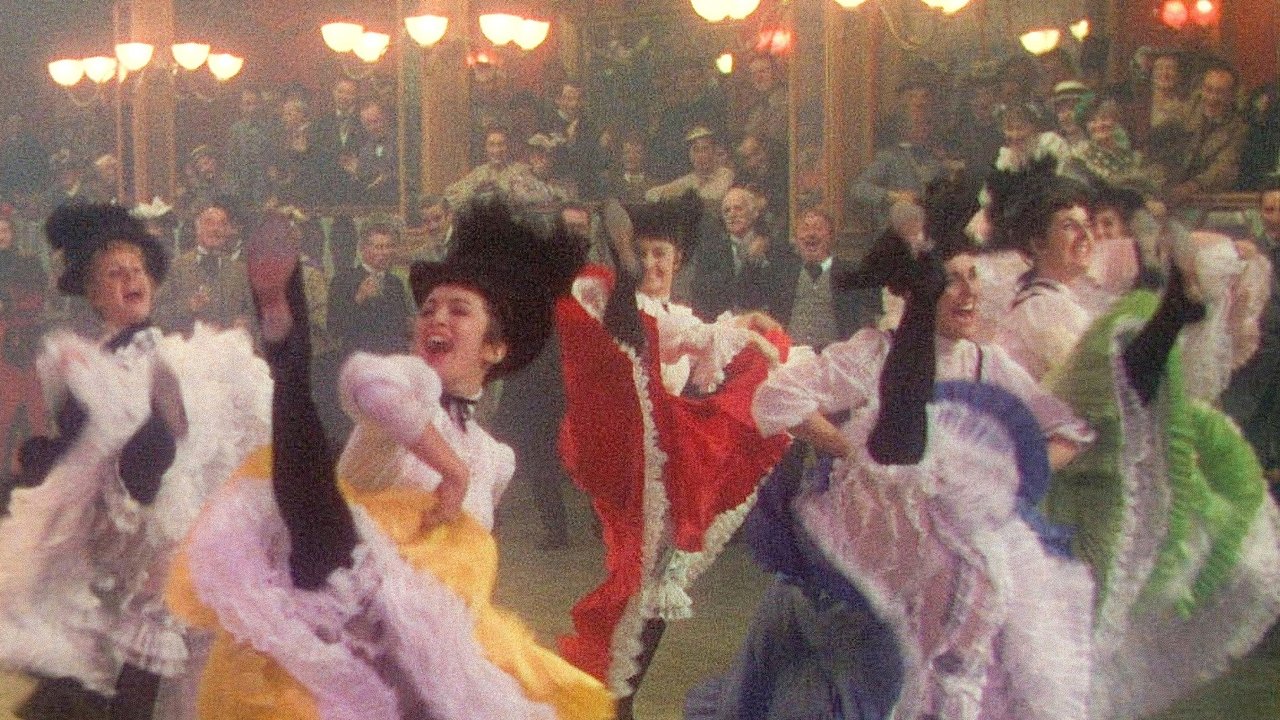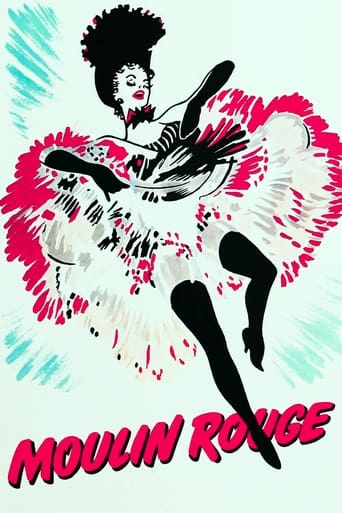

This film is not to be mistaken for the extravagant Baz Luhrrmann / Nicole Kidman / Ewan McGregor masterpiece musical, this film from Oscar nominated director John Huston (The Asphalt Jungle, The African Queen, Prizzi's Honor) is the original version it was based on. Basically in the year 1890 in Paris, France, young artist Henri de Toulouse- Lautrec (Oscar nominated José Ferrer) is a frequent visit at the Moulin Rouge nightclub, there he enjoys a drink of cognac and draws sketches of the dancers and singers, including Jane Avril (Zsa Zsa Gabor). Henri is the son of a French count, his legs were badly deformed by a childhood fall, he stands at four-foot six- inches tall, and he has an unhappy time in his personal life. Whilst going home one night he asked for a help by a young woman on the streets, the spirited Marie Charlet (Golden Globe winning, and Oscar and BAFTA nominated Colette Marchand), after some time he falls in love with her and they become involved in an uproarious relationship. As time goes by however it becomes increasingly difficult for Henri to balance his personal feelings, his artistic abilities and his family name and position, but he does go on to become a great master of Impressionism. Also starring Ferrer as Count Alphonse de Toulouse-Lautrec - his father, Suzanne Flon as Myriamme Hayem, Katherine Kath as La Goulue, Claude Nollier as Countess Adèle de Toulouse-Lautrec, Muriel Smith as Aicha and Georges Lannes as Police Sergeant Patou. Ferrer gives a great performance as the dwarf artist (not sympathy seeking) who has many weaknesses that are brought out, and Gabor with her time on screen makes a beautiful dancer, there are some good elaborate dance and performance sequences, but most of the film I found too chatty, obviously it is based on a true story, seeing the dark side of the glitzy world was good, and there is good use of colour and costume, but I think you should stick to the 2001 remake, but this is an interesting biographical drama film. It won the Oscar for Best Art Direction-Set Decoration and Best Costume Design, and it was nominated for Best Picture and Best Film Editing, it was nominated the BAFTA for Best British Film and Best Film from any Source. Worth watching!
... View MoreThis is a gorgeous Technicolor film which tells the tale of Tolouse Lautrec, admirably portrayed by Jose Ferrar. The atmosphere is perfectly drawn by director John Houston, who recreates the Paris of the late nineteenth-century to a T. Zsa Zsa Gabor, who was quite young and beautiful here does fine in a rather flashy part. The theme song was quite the hit when it charted over here. Special mention must be made of the fine use of Technicolor, which was used in a manner mindful of Lautrec's paintings. The colors are warm and vivid, and everything has a kind-of look as if you just stepped out of a time machine. The beautiful hues aside, this is a film which will entertain by virtue of it's fascinating story alone, and to me, is a far better film than the 2001 feature of the same name. It's not really fair to compare the two, though, as the two films are quite different in story, sharing only the title. A one-of-a-kind film and a rewarding one.
... View MoreJose Ferrer is absolutely convincing as Henri Toulouse-Lautrec the artist. A man tortured by a childhood accident that revealed an inherited genetic defect and left him in constant pain with legs that did not grow to full length. As a result he was shorter than most women. He was emotionally unable to overcome this and fell into despair thinking himself to be ugly and undesirable to women. The pain and the disability caused him to seek relief in the form of Cognac drank with increasing frequency. It occurred to me that death at so young an age was a tragic loss of talent. And yet, had he not developed his disability, he would most likely have grown up and been much like his father, a gentleman, statesman, and wealthy socialite, his talent as an artist never developed to its potential. His self deprecating attitude prevented him from trusting his feelings with others. After one bad experience with an emotionally damaged woman he never allowed himself to admit love again. He immersed himself in his art and his surroundings, but never another woman. His love interest was played exceptionally well by a lovely, spirited, enchanting woman, Colette Marchand. She too was a tortured soul, wanting happiness and a better life so badly it hurt, but she was so emotionally damaged she was not content in the "upper class" life of Lautrec. According to the movie plot Henri loved her to the end. An end that came much too soon due in part to his alcoholism and his illness. His parents were first cousins which caused some serious health problems due to inbreeding. This movie was so well executed I gave it a 9 but I always leave room for a 10 "just in case". Great detail is given to his art form and there are many of his paintings displayed throughout. (I am certain they were authentic looking duplicates) The costumes and clothing look spot on perfect. Lots of color, wild dancing and music. I am certain if you like movies from this period you will enjoy a look into the life of Henri Toulouse Lautrec. I have not seen the more recent version of this movie but I find it hard to believe anyone would think themselves capable of doing justice to the original. Perhaps I will have to rent it just to satisfy my curiosity.
... View MoreA part from the astonishing atmosphere rendered here, what would the real Toulouse-Lautrec think about being a movie star ?He was a only little known at his time, living in the creepy Montmartre of the end of 19th century. Montmartre was a bad suburb of Paris then, not only "popular", but inhabited by the poorest people living in slums, rejected or even hiding from the police. As it seems these people new about partying though, and Toulouse-Lautrec the cripple wanted to have fun ! Spending his time in places that were absolutely not suitable like the famous Moulin Rouge cabaret. Movie itself was just about to be invented. ( by two brothers: "les frères Lumière", who were closer to the "good" society of Paris)Why is the man of the brothels as great as Louis VIX the sun king or Napoleon in our cultural memory ?.(all three were very small)....Here we are facing the point that is involved by this movie: This little man, was not pretending anything, just showed us how to be simple, and glorified simple people through his art. John Hudson understands this very early, utilizing his art to glorify a man who once glorified mankind.
... View More